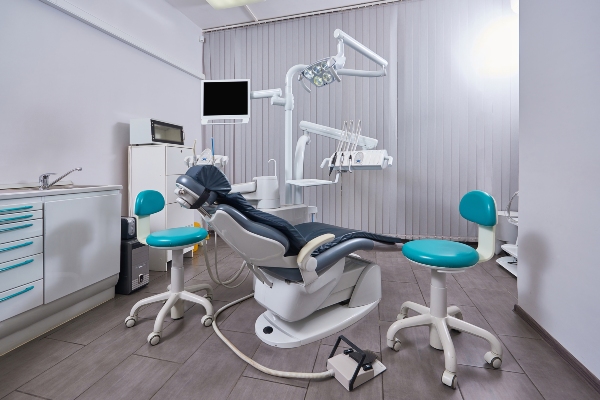 Though many dental practices may label themselves as temporomandibular joint dysfunction (TMJ) treatment centers, a
general dentistry office is more than qualified to help patients suffering from symptoms of TMJ. Learn more below about the symptoms of TMJ, treatments a general dentist may try, and what can happen if you delay treatment.
Though many dental practices may label themselves as temporomandibular joint dysfunction (TMJ) treatment centers, a
general dentistry office is more than qualified to help patients suffering from symptoms of TMJ. Learn more below about the symptoms of TMJ, treatments a general dentist may try, and what can happen if you delay treatment.
What is TMJ?
TMJ is a shorthand way of referring to temporomandibular joint dysfunction. When a dentist refers to "TMJ," this professional refers to both the joint itself and the pain that may be caused if it is not working properly. TMJ symptoms may be caused by bruxism, jaw clenching, arthritis, injury, or a dysfunction of the jaw joint itself. According to the Mayo Clinic, symptoms a TMJ patient may experience can include the following:
- Pain in or around the jaw area
- Pain in the temporomandibular joints
- Earaches
- Trouble talking, chewing, kissing, or doing anything that involves moving the jaw
- Locking of the jaw (which can be an emergency situation if it is severe)
How can a general dentistry practice treat TMJ?
General dentistry practices focus on determining the cause of the patient's TMJ in order to devise the most appropriate treatment plan. For example, if the patient's TMJ is becoming sore due to nighttime grinding, or bruxism, the dentist may prescribe a nightguard that does not allow the patient to grind or clench their teeth while sleeping. Other patients who have recurring TMJ after eating specific foods may need to transition to a softer diet for a while to give the TMJ time to heal.
It is important to note that a minority of patients have TMJ issues that stem from a condition such as arthritis, while other patients grind teeth due to excessive stress. However, even if this is the case, nightguards and other TMJ treatments can provide symptomatic relief for the jaw pain caused by these conditions. Therefore, a general dentist should further advise patients on this issue.
It is never wise to delay treatment for any dental condition — especially if you are experiencing a great deal of pain that does not go away with self-treatment. Instead, patients with TMJ symptoms should visit a licensed general dentistry office to discuss symptoms with the dentist and determine the next step forward. TMJ can wreak havoc on a person's quality of life with chronic muscle pain, jaw symptoms, and headaches that stem from the sore joints, ligaments, and muscles.
Conclusion
Seeking out treatment for TMJ conditions can be complicated. Still, patients should start with their general dentistry office to gain solid advice from a trusted professional and create a treatment plan. Patients should note that many professionals claim to be TMJ specialists who do not have any license or specific qualifications for treating this condition. Try to avoid claims that seem too good to be true and practices that offer treatments that have no research backing the claims. Most cases of TMJ can be successfully helped within a general dentistry practice.
Request an appointment or call Haratz Dental at 786-433-5232 for an appointment in our Aventura office.
Related Posts
Making a strong connection with a general dentist as part of an overall team of health care providers can lead to better patient compliance and satisfaction. Patients looking for a new dentist should consider several factors before committing to one. Although shopping around for a general dentist may seem initially burdensome, in the long run…
A general dentist is frequently called upon to diagnose and treat dental abscesses. Failure to get treatment for this infection can have serious health consequences.A tooth is said to be abscessed when a pocket of pus forms due to a bacterial infection. Patients who exhibit symptoms of an abscess should see a dental professional.People experiencing…
When a patient has a cavity, a general dentist thoroughly takes out all the decayed area of the tooth and replaces it with a filling in the empty space to prevent future decay. When it comes to the type of filling, there are various options from which the patient may choose. They each have advantages…
